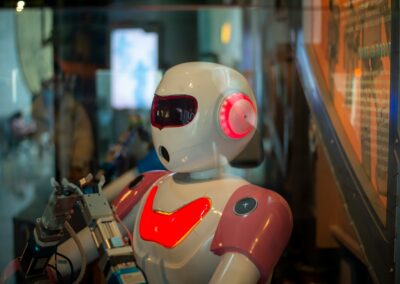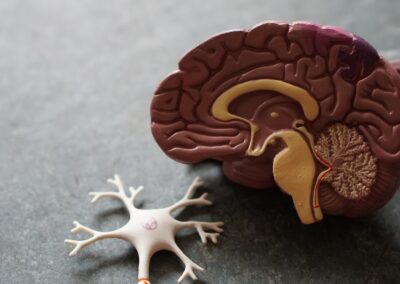Exploring the New Horizons of Human-Machine Symbiosis
The Potential of AI in Enhancing Human Capabilities
The future of human evolution with AI involves exploring how artificial intelligence can enhance and extend human capabilities, leading to new forms of human-machine symbiosis. As AI continues to advance, its potential to augment human abilities in various fields, particularly for business executives, mid-level managers, and entrepreneurs, becomes increasingly significant. In regions like Saudi Arabia and UAE, which are at the forefront of technological innovation, understanding and leveraging AI’s potential can drive substantial growth and success.
AI can significantly enhance cognitive functions such as memory, learning, and decision-making. Personalized educational tools and cognitive training programs powered by AI can tailor learning experiences to individual needs, enhancing educational outcomes and workforce readiness. For instance, AI-driven platforms can analyze learning patterns and provide customized recommendations, ensuring that each individual reaches their full potential.
Moreover, AI can assist in complex problem-solving and strategic decision-making. By analyzing vast amounts of data and identifying patterns, AI can offer insights that humans might overlook. This capability is particularly valuable in business environments where quick, informed decisions are crucial. In cities like Riyadh and Dubai, where business competitiveness is high, AI can be a game-changer in maintaining a competitive edge.
AI in Enhancing Physical and Sensory Abilities
Beyond cognitive enhancement, AI holds promise in augmenting physical and sensory capabilities. Innovations in robotics and wearable technology are paving the way for enhanced human-machine interactions. For example, AI-powered exoskeletons can assist individuals with mobility impairments, enabling them to perform tasks they previously could not. This technology not only improves quality of life but also expands the potential workforce by including individuals who might otherwise be limited by physical disabilities.
In the realm of sensory enhancement, AI is driving advancements in areas such as vision and hearing. AI-powered devices can enhance visual and auditory experiences, enabling individuals to perceive their environments in new ways. For instance, AI-driven hearing aids can filter out background noise and enhance speech recognition, significantly improving communication for individuals with hearing impairments. In business settings, such enhancements can facilitate better communication and collaboration.
Furthermore, AI’s role in medical and healthcare applications is transformative. AI-powered diagnostic tools and personalized treatment plans can lead to more accurate and efficient healthcare delivery. In the Middle East, where healthcare systems are rapidly evolving, integrating AI into medical practices can significantly improve patient outcomes and streamline healthcare processes. This integration not only enhances individual capabilities but also contributes to overall societal well-being.
Ethical Considerations and Challenges
While the potential benefits of AI in enhancing human capabilities are immense, there are important ethical considerations and challenges that must be addressed. One of the primary concerns is ensuring that AI technologies are developed and used in ways that respect human rights and dignity. This includes addressing issues of privacy, security, and consent. For example, AI systems that collect and analyze personal data must do so transparently and with the individual’s informed consent.
Another ethical consideration is the potential for inequality. As AI technologies become more integrated into society, there is a risk that the benefits may not be evenly distributed. Ensuring equitable access to AI-enhanced capabilities is crucial to preventing disparities between different social and economic groups. Policies and frameworks must be established to promote inclusive access to AI technologies, ensuring that all individuals can benefit from these advancements.
Moreover, the integration of AI into human capabilities raises questions about the nature of human identity and agency. As AI systems become more capable and autonomous, it is essential to consider how these technologies might influence human decision-making and autonomy. Ensuring that humans remain in control of AI systems and that these systems are designed to augment rather than replace human capabilities is crucial to maintaining a balance between human and machine intelligence.
The Path Forward: Integrating AI Responsibly
Building a Framework for Ethical AI Integration
To navigate the future of human evolution with AI, it is essential to establish a robust framework for ethical AI integration. This involves developing guidelines and standards that prioritize transparency, accountability, and inclusivity. Businesses and governments must collaborate to create policies that promote the responsible use of AI technologies, ensuring that they enhance rather than undermine human capabilities.
Transparency is key to building trust in AI systems. Businesses should ensure that AI-driven processes are explainable and understandable, providing clear information about how decisions are made. This transparency helps users trust and adopt AI technologies, particularly in sensitive areas such as healthcare and finance. For example, AI systems used in medical diagnostics should provide clear explanations of how conclusions are reached, enabling healthcare professionals to make informed decisions.
Accountability involves establishing mechanisms to monitor and evaluate the impact of AI systems. Regular audits, impact assessments, and feedback loops are essential to ensure that AI technologies align with ethical standards and societal values. By continuously assessing the performance and implications of AI systems, businesses can identify and address potential ethical concerns, promoting responsible AI integration.
Fostering a Culture of Ethical AI Use
Creating a culture of ethical AI use requires a commitment to continuous learning and development. Businesses should invest in training programs that equip employees with the skills and knowledge needed to navigate the evolving AI landscape. This includes fostering an understanding of ethical principles and encouraging critical thinking about the broader implications of AI technologies.
Leaders play a crucial role in promoting ethical AI practices. By setting a positive example and prioritizing ethical considerations in decision-making, leaders can inspire a culture of integrity and responsibility. Engaging with experts, policymakers, and stakeholders helps ensure that AI strategies are aligned with ethical standards and societal goals. This collaborative approach promotes a holistic understanding of AI’s impact and fosters a shared commitment to ethical AI integration.
Moreover, businesses should involve diverse perspectives in the design and implementation of AI systems. Inclusivity is essential to ensuring that AI technologies are equitable and accessible to all. By considering the needs and viewpoints of different communities, businesses can develop AI solutions that address a broad range of challenges and opportunities, promoting social and economic well-being.
Conclusion: Embracing AI for a Better Future
The future of human evolution with AI holds immense potential for enhancing human capabilities and driving societal progress. For business leaders in Saudi Arabia, UAE, Riyadh, and Dubai, understanding and leveraging AI’s potential is crucial for achieving success in a rapidly evolving technological landscape.
By adopting ethical AI practices and fostering a culture of responsibility, businesses can navigate the challenges and opportunities of human-AI integration. Innovations in AI, from cognitive enhancement to sensory augmentation, offer exciting possibilities for enhancing individual and societal capabilities. However, addressing ethical considerations and ensuring equitable access to AI technologies are essential to realizing these benefits.
Ultimately, the future of human evolution with AI depends on our ability to integrate these technologies responsibly and ethically. By prioritizing transparency, accountability, and inclusivity, we can harness the power of AI to create a better, more equitable world, where human capabilities are enhanced and societal progress is accelerated.
—
#AIandHumanEvolution #ArtificialIntelligence #HumanMachineSymbiosis #AIinSaudiArabia #AIinUAE #AIinBusiness #AIandHumanCapabilities #AIFutureTrends #AIEthics #AIIntegration































